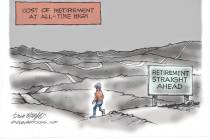EDITORIAL: Free our land
The state’s campaign to wrest control of massive stretches of land from the federal government is under way, thanks to the opportunity created by this year’s passage of Assembly Bill 227.
As reported Dec. 7 by the Review-Journal’s Sean Whaley, the law created the Nevada Land Management Task Force, which is charged with evaluating whether the state should consider assuming responsibility for some public land managed by federal agencies.
We already know the answer to that question: Yes.
Washington controls about 85 percent of the land in the Silver State; 76 percent is overseen by the Bureau of Land Management. It’s an outrageous amount of property, especially when compared with the amount of land the federal government controls east of Texas. At a Dec. 6 meeting of the task force in Carson City, state Sen. Pete Goicoechea, R-Eureka, rightly pointed out that Nevada and all Western states “want to be admitted to the Union on the same footing as the eastern states, where only 4 percent of the land is federally controlled.”
Kyle Davis, the political and policy director of the Nevada Conservation League, argued against the idea of the state taking over federal land on the basis that Nevada has not demonstrated the capability and willingness to manage that land.
And the federal government has shown that capability and willingness? The same government that spends millions of dollars killing off the Devil’s Hole pupfish, an endangered species the public never gets to see? The same government that, in California, once ostensibly marched hundreds of desert tortoises to their deaths in an effort to return them to their “natural” habitat?
The largest problem with federal control is that, more often than not, “control” is the operative word. From wild horses to wildfires, the government’s land management track record in Nevada and the rest of the West is downright awful.
For Nevada’s economy to grow and diversify — especially in rural areas of the state — this land must be free of federal restrictions on its use. Without those restrictions, Nevada could join the country’s energy boom and explore opportunities in technology and aerospace. The best way to accomplish that is to eventually get vast acreage into private hands to generate job creation and property tax revenue. The government pays the state pennies on the dollar — if that — for all the land it owns. The land would be better managed if the people who are closest to it are in charge of it.
The task force will submit its findings to the Legislative Committee on Public Lands by Sept. 1.
Getting federal land into private hands is a process that could go on for generations. It won’t be easy, but it’s incumbent on Nevada and other Western states to keep this issue at the forefront, and for local entities — both public and private — to prove they are indeed capable and willing.























